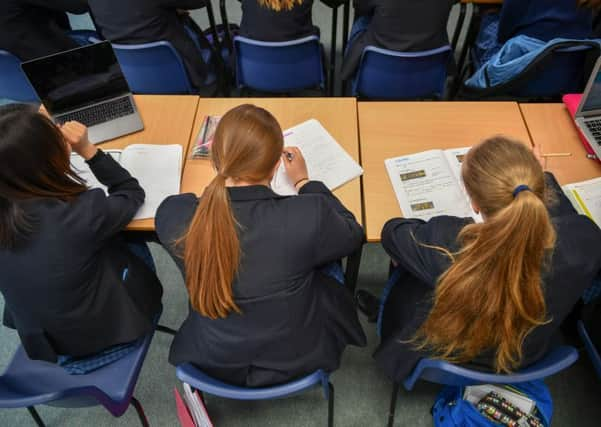Spending per pupil in South Tyneside drops as teachers warn schools are '˜on their knees'


Analysis of figures from the Department for Education (DfE) show that, this year, the council will spend £112 less on each pupil than last year, after the figures are adjusted for inflation.
Teachers say that schools across the country are “on their knees”, warning that funding cuts are causing “untold damage” to children and young people’s education.


Advertisement
Hide AdAdvertisement
Hide AdIn 2017-18, spending per pupil in South Tyneside was the equivalent of £4,711, in real terms.
This financial year, that figure is £4,599 – a drop of 2%.
In England, per-pupil spending has fallen by 1% in real terms, from £4,573 in 2017-18 to £4,528 this year.
The annual schools’ budget comes directly from the Government in the form of a centralised grant. In South Tyneside, the allocated budget for 2018-19 is £103.8million.
Coun Moira Smith, lead member for children, young people and families at South Tyneside Council, said: “Despite the government’s plans to introduce a new national funding formula for schools, the real problem continues to be the lack of money in the system overall.
Advertisement
Hide AdAdvertisement
Hide Ad“Research by the Institute of Fiscal Studies has shown South Tyneside to be the third hardest hit council in the country as a result of reductions in government spending, We now have 54 per cent less to spend on helping the people of South Tyneside. That is £746 less for each household, a staggering £402 worse off than the national average.
“However, despite these financial pressures, we remain committed to giving every child and young person the best start in life and will continue to work with our schools to make sure all pupils receive an outstanding learning experience.”
The Department for Education said that school funding in England will rise to a record £43.5billion by 2020, and that funding for pupils with additional needs has risen from £5billion in 2013 to over £6 billion this year.
“We know we are asking schools to do more,” said a DfE spokesperson. “That’s why the Education Secretary has set out his determination to work with the sector to reduce cost pressures, including things like stationery, energy and water bills.”
Advertisement
Hide AdAdvertisement
Hide AdThe National Education Union (NEU) said that the DfE’s claim is “disingenuous”, “misleading to parents” and “insulting to schools”.
NEU’s joint general secretary Dr Mary Bousted said: “It ignores the impact of inflation and the increase in student numbers.
“Schools are on their knees and need significant investment to reverse the cuts of the last three years, address historic underfunding of some areas and tackle the crisis in school funding for pupils with special needs.”
The National Association of Head Teachers (NAHT) said they were concerned that schools could no longer afford to employ specialist staff for children with special education needs.
Advertisement
Hide AdAdvertisement
Hide Ad“It’s becoming harder for mainstream schools to be inclusive,” said NAHT head of policy Valentine Mulholland.
She said: “Funding cuts are not just affecting the education of children, they’re affecting the wellbeing of children.
“We need to be able to support all students, not just the most able ones. The most vulnerable pupils are being left behind.”
The Local Government Association (LGA) said that it shares the concerns of schools over the “squeeze” on funding, and the possible impact on the quality of education children receive.
Advertisement
Hide AdAdvertisement
Hide AdLGA’s children and young people chairman, Coun Antoinette Bramble, said: “To make sure every school is adequately funded, the Government should introduce three-year budgets and allow councils to work with schools to set budgets that reflect local need.”